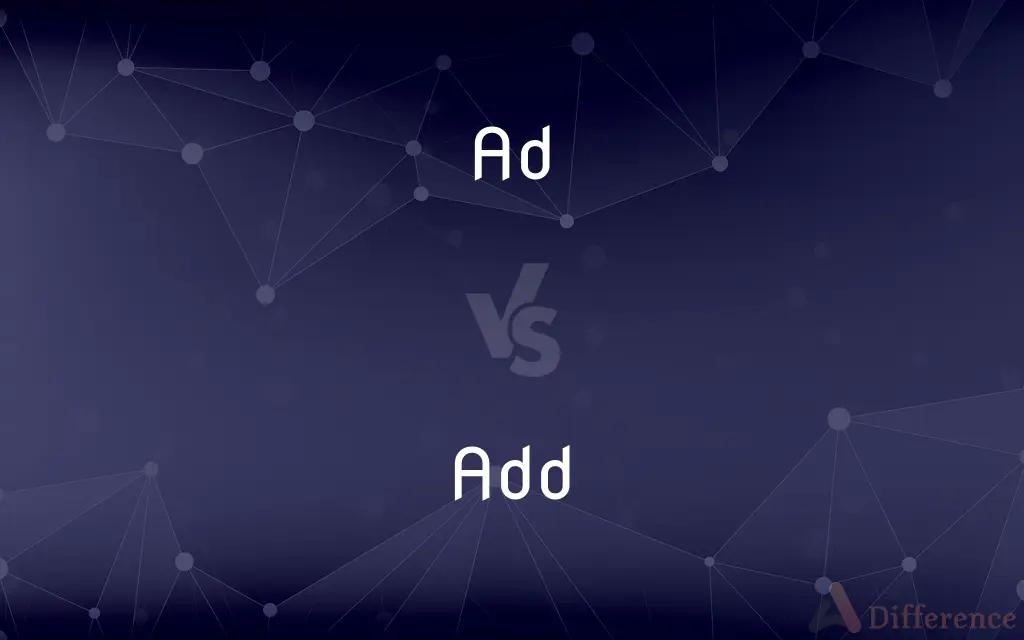Ad vs. Add — What's the Difference?
Edited by Tayyaba Rehman — By Fiza Rafique — Updated on November 2, 2023
"Ad" is short for advertisement, a promotional message, whereas "add" is a verb meaning to join or combine.

Difference Between Ad and Add
Table of Contents
ADVERTISEMENT
Key Differences
"Ad" is an abbreviation for advertisement; it's a noun used in marketing. "Add" is a verb that means to combine one thing with another.
The function of "ad" is to attract public attention to a product, service, or event. Meanwhile, "add" represents the action of including something additional or contributing an extra amount.
"Ads" are encountered in various media, including TV, online platforms, and printed materials. Conversely, "add" is a mathematical term as well, used when totaling numbers.
An "ad" can inform, persuade, or remind consumers about choices available to them. On the other hand, to "add" can extend beyond numbers to ideas, like adding one's opinion to a discussion.
When creating an "ad," creativity is a must to capture interest, whereas when we "add" something, precision is key to ensure accuracy.
ADVERTISEMENT
Comparison Chart
Part of Speech
Noun
Verb
Definition
A public promotion of some product or service
To join something to another
Usage
In marketing and media
In mathematics and general language
Example
"The ad was displayed on billboards."
"Please add these figures for me."
Synonyms
Advertisement, commercial, promotion
Include, join, sum, insert
Compare with Definitions
Ad
Marketing message.
That ad on TV last night was hilarious.
Add
Include extra.
Add some salt to the recipe, please.
Ad
Promotional content.
I skipped through the ads in the podcast.
Add
To join together.
Add the attachment to the email.
Ad
Commercial promotion.
The company released a new ad for their product.
Add
Join (something) to something else so as to increase the size, number, or amount
A new wing was added to the building
Some box offices now add on a convenience charge
Ad
Public notice.
There was an ad in the newspaper for a lost dog.
Add
Put in (an additional element, ingredient, etc.)
Chlorine is added to the water to kill bacteria
Ad
Paid announcement.
They placed an ad in the magazine.
Add
Put together (two or more numbers or amounts) to calculate their total value
Add the two numbers together
They added all the figures up
Ad
An advertisement
The latest television lager ad
Add
Say as a further remark
We would like to add our congratulations
‘I hope we haven't been too much trouble,’ she added politely
Ad
Short for advantage
Add
To join or combine (numbers) through addition
If you add 5 and 10 and 17, the result is 32. If you add 6 to 8, you get 14.
Ad
An advertisement.
Add
To join or unite so as to increase in size, quantity, quality, or scope
Added 12 inches to the deck.
Flowers that added beauty to the dinner table.
Ad
An advantage in tennis.
Add
To say or write further.
Ad
Abbreviation of advertisement
I have placed both of the ads in the newspaper as instructed.
Add
To find a sum in arithmetic.
Ad
Abbreviation of advertising
Add
To constitute an addition
An exploit that will add to her reputation.
Ad
Abbreviation of advertiser
Add
To create or make an addition
Gradually added to my meager savings.
Ad
(tennis) Advantage; also, designating the left-hand side, from the player's point of view, of their half of the court, where the advantage point following a deuce is always played.
Add
(transitive) To join or unite (e.g. one thing to another, or as several particulars) so as to increase the number, augment the quantity, or enlarge the magnitude, or so as to form into one aggregate.
Ad
(debating) advantage
Ads and disads
Add
To sum up; to put together mentally; to add up.
To add numbers
Ad
To, toward
Add
(transitive) To combine elements of (something) into one quantity.
To add a column of numbers
Ad
A public promotion of some product or service
Add
(transitive) To give by way of increased possession (to someone); to bestow (on).
Ad
In the Christian era; used before dates after the supposed year Christ was born;
In AD 200
Add
(transitive) To append (e.g. a statement); to say further information; to add on.
Add
(intransitive) To make an addition; to augment; to increase; to add on.
It adds to our anxiety.
Add
To perform the arithmetical operation of addition.
He adds rapidly.
Add
To summon minions or reinforcements.
Typically, a hostile mob will add whenever it's within the aggro radius of a player.
Add
(radio) The addition of a song to a station's playlist.
Add
(computer science) An act or instance of adding.
Add
(video games) An additional enemy that joins a fight after the primary target.
When the player has fought the boss for one minute, two adds will arrive from the back and must be dealt with.
Add
To give by way of increased possession (to any one); to bestow (on).
The Lord shall add to me another son.
Add
To join or unite, as one thing to another, or as several particulars, so as to increase the number, augment the quantity, enlarge the magnitude, or so as to form into one aggregate. Hence: To sum up; to put together mentally; as, to add numbers; to add up a column.
Back to thy punishment,False fugitive, and to thy speed add wings.
As easily as he can add together the ideas of two days or two years.
Add
To append, as a statement; to say further.
He added that he would willingly consent to the entire abolition of the tax.
Add
To make an addition. To add to, to augment; to increase; as, it adds to our anxiety.
Add
To perform the arithmetical operation of addition; as, he adds rapidly.
Add
A condition (mostly in boys) characterized by behavioral and learning disorders
Add
Make an addition (to); join or combine or unite with others; increase the quality, quantity, zise or scope of;
We added two students to that dorm room
She added a personal note to her letter
Add insult to injury
Add some extra plates to the dinner table
Add
State or say further;
`It doesn't matter,' he supplied
Add
Bestow a quality on;
Her presence lends a certain cachet to the company
The music added a lot to the play
She brings a special atmosphere to our meetings
This adds a light note to the program
Add
Make an addition by combining numbers;
Add 27 and 49, please!
Add
Determine the sum of;
Add all the people in this town to those of the neighboring town
Add
Constitute an addition;
This paper will add to her reputation
Add
To combine numbers.
If you add 4 and 5, you get 9.
Add
To say further.
She wanted to add a comment about the service.
Add
To increase amount.
Add another chair; we have more guests.
Common Curiosities
Is "add" ever a noun?
Rarely, "add" can be a noun in contexts like "an add-on."
Can "ad" be used as a verb?
No, "ad" is typically used as a noun.
Can "add" be used in different contexts?
Yes, such as adding numbers, ingredients, or comments.
How do you use "ad" in a sentence?
"I saw an interesting ad for shoes online."
What is the purpose of an ad?
To promote or sell a product or service.
What does "ad" stand for?
"Ad" is short for advertisement.
What does it mean to "add"?
To "add" means to join or combine together.
How do you use "add" in a sentence?
"Add these two numbers to get the total."
Can "ad" be pluralized?
Yes, as "ads."
Can "ad" and "add" be used interchangeably?
No, they have different meanings and uses.
Are there different types of ads?
Yes, including print, online, and broadcast ads.
Do ads only sell products?
No, ads can also promote events or services.
What is the past tense of "add"?
The past tense is "added."
What's the result of an "add" action?
It results in a total or a combination.
Is there a mathematical term related to "add"?
Yes, "addition" is the related term.
Share Your Discovery

Previous Comparison
Genes vs. Jeans
Next Comparison
Weekday vs. WeekendAuthor Spotlight
Written by
Fiza RafiqueFiza Rafique is a skilled content writer at AskDifference.com, where she meticulously refines and enhances written pieces. Drawing from her vast editorial expertise, Fiza ensures clarity, accuracy, and precision in every article. Passionate about language, she continually seeks to elevate the quality of content for readers worldwide.
Edited by
Tayyaba RehmanTayyaba Rehman is a distinguished writer, currently serving as a primary contributor to askdifference.com. As a researcher in semantics and etymology, Tayyaba's passion for the complexity of languages and their distinctions has found a perfect home on the platform. Tayyaba delves into the intricacies of language, distinguishing between commonly confused words and phrases, thereby providing clarity for readers worldwide.














































